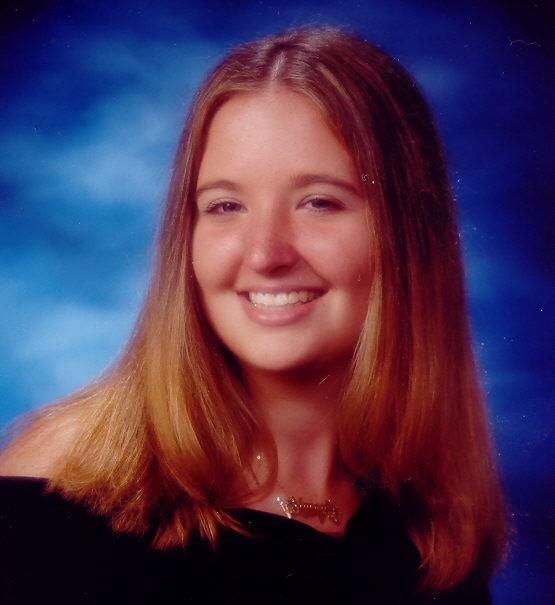
My sister Stacey stood there in the dining room, her keys in one hand on a black and white cheerleader lanyard, blonde highlights through her dark brown hair. She was talking to our mom. Mom had that sixth sense, that intuition only the best mothers have. She knew better than to let Stacey go that night, but my sister was determined. I guess it was about 10 p.m. or so -- time seemed so insignificant then. So, Stacey left. She left with the promise that she would be back later. I rolled over not long after and slept away my naiveté.
It was about 4 a.m. I can see the green digital numbers illuminating my sleep-riddled eyes still. It was the doorbell that woke me up. It was the deafening scream of my mother that drew me to the living room. I stood in a pair of boxers immediately asking what was wrong. Two state troopers were there talking to my dad. My dad robotically interacted with them; the shield of shock had enveloped him. My mom sat on the couch, paralyzed with the news that was just told to her. She clutched a golden-framed picture of Stacey's senior portrait as if it were a substitute for Stacey herself. She too was living in a different reality.
As if it were a reflex, she told me to return to my room. I, sensing the urgency of the moment, my heart beating uncontrollably, returned to my room. I sat down on my bed for what seemed like a matter of seconds before my mom came in my room to tell me Stacey was in a car accident. I, shedding away the last of my ignorance, responded by asking if she was okay. My mom never responded; tears poured down her face. I hugged her immediately; I did not need an answer. Stacey had lost control of her vehicle on a winding rural road in bad weather. After they finally retrieved her from the vehicle, she went into cardiac arrest three times in the ambulance on the way to hospital. The accident happened a little after 1 a.m. She was declared dead at 2:45 a.m. in the emergency room.
I returned to the living room with my mother after the troopers left. My father joined us on the couch; together we sat there in disbelief. There is no way to understand this moment still. The three of us sat on the couch, in the well-lit living room, the darkness of the early morning hours peering through every window. My mom said over and over that she was not going to be able to get through this. She said what we all felt. The hospital called what seemed like moments later; my parents left to go see Stacey. They asked me if I wanted to go. I said no. There was no way I could bare seeing her lifeless body, wounds visible, on a cold impersonal gurney in the worthless emergency room. Instead, I spent that time alone in my room sitting on my bed, a single lamp on, trying to grasp, trying to understand. That was impossible. My life had changed forever; I would never see my sister again.
It felt as if we were living in some alternate universe, as if the reality in which we were living was surreal. These things do not happen to people like us. Truthfully, they happen to everyone. Our fallibility is real. Even now as I write my thoughts it seems like I am writing about some fictional event; I cannot believe I went through this.
We all dealt with our grief in those days a little differently. My father, a burly, average-height man with thinning hair, grieved deeply for Stacey. He and Stacey had a very special relationship, the admirable father-daughter type. My mother, a slight and shorter woman with shoulder-length hair, also was struck deeply with Stacey's passing. Stacey and my mom were very close, Stacey seemed to always confide in my mother, and I know my mother cherished this. For many months after, my mom would find herself uncontrollably crying at work, the reality of Stacey being gone becoming real and then fading away again. My parent's marriage stood strong throughout this ordeal.
Seeing Stacey lying in a casket, her embalmed body at rest, ready for eternal respite, has returned to my memory often these past eight years. I remember bending over to kiss her lifeless forehead, the cold seeping into my lips. I remember her face, eyes forever shut off from the world, from us.
About a week before she died, Stacey was visiting a couple of her best friends. They were at a diner having breakfast. Somehow, the conversation turned to an atypical topic for teenagers: death. Stacey casually mentioned that she wanted to have her face on her headstone when she died. She also said she wanted to be buried on a hill to be closer to God. This was her desire for eternity; this is my comfort for eternity. Stacey was buried on a sunny, green, and quiet hillside with her smiling face sandblasted onto a dark red granite headstone.
There is no easy way to deal with death. There is no phrase which by its mere utterance will cure a bereaved person. I have learned this. This experience has allowed me to garner a motto for life: "Every day you're alive, there's a reason to smile."
It is my hope that my personal narrative has helped you to stop, slow down, and appreciate what you have in life. Tragedies do not need to be an abrupt dark hole in our lives, but rather an invaluable lesson which can lead to a sunny day. You must not live for what was, but live for what can be.

For more on death and dying, click here.
For more by Zachary K. Pearce, click here.